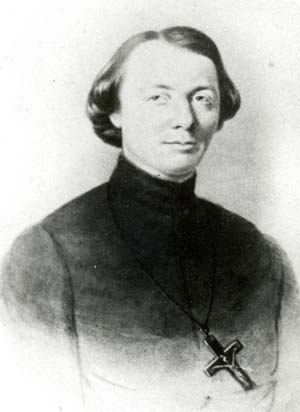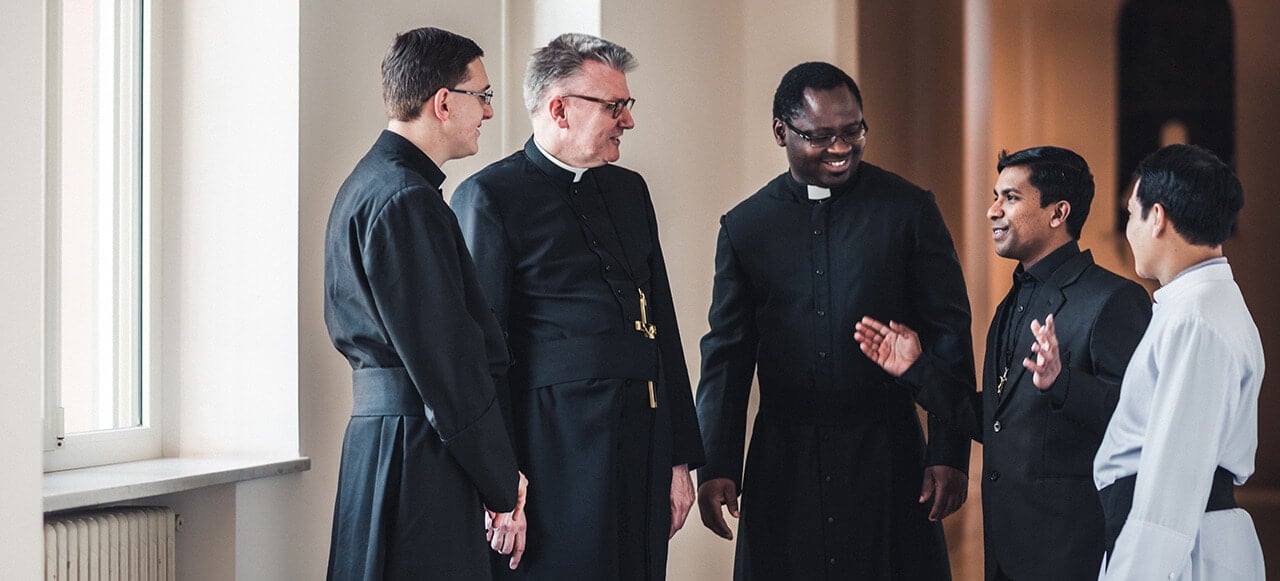
Casimir AUBERT, OMI
The vocation the young priest, Fr. William Daly, and his departure for England in the month of May, 1841, marked the providential arrival of the first Oblates in the British Isles. Father Daly had left Marseille with the primary goal of preaching the gospel wherever he could, to Catholics as well as to Protestants. The Founder had also given him the responsibility of recruiting as many English speaking candidates as possible who could later reinforce his efforts to convert this part of the Lord’s vineyard. After a few months of preaching and of important contacts with the religious authorities of the country, he had the joy of being able to send to the novitiate at Notre-Dame de l’Osier a couple of very fine young men. Nevertheless, Bishop de Mazenod knew well that he could not leave this young religious alone with such great responsibilities for much longer. That it why he decided to send to England someone he trusted, Father Casimir Aubert. Doctor of theology, novice master for several years, professor of moral theology, and superior of the Calvary in Marseille, he was intelligent, prudent, and wise, and he enjoyed the complete confidence of the Founder. Often he served as the Founder’s secretary and, throughout his life, he had the most steadfast devotion for his spiritual father.
Therefore, Father Aubert left in July, 1842. “I hope that the Good Lord will watch over me and that the Blessed Virgin will take care of her child,” he wrote from Lyon to Bishop de Mazenod. He was hoping to begin in Ireland where he thought he would have a chance at better results among the compatriots of Father Daly. After a few unsuccessful attempts to establish himself in the great country of O’Connell, God led him, in 1843, toward England itself, where a vast field of action was available for the Oblates. During the months that he spent looking things over, he sometimes found himself in surprising circumstances which lead us to believe that truly the Lord was taking him by the hand. There was, for example, his unexpected appointment as a professor at Youghal College in Southern Ireland.
In 1842, Father Foley, a man of great poverty but rich in virtue, decided to open at Youghal a college destined to provide priests for the foreign missions. The courses offered there were extremely weak: the staff was made up of only two priests for sixty students. From the very beginning, there was an enormous difficulty that threatened the very existence of the college. They had no professor of philosophy and theology. Nor did they have the money to employ one. They had little hope of a solution. That’s how things were at the beginning of September when, on the evening of a rainy day, a strange looking man, poorly dressed and obviously worn out after a long journey, knocked at the door of the college and asked to speak to the rector. Father Foley introduced himself and asked the purpose of the visit.
The stranger answered that he was looking for a job as a professor. “Who are you?” asked the rector, “and what can you teach?” “I am a priest from Southern France,” answered the stranger, “and I can teach just about everything, from Latin grammar to Canon Law, as well as philosophy and theology.” The rector thought he was dreaming as he heard those words. But he came quickly back to earth, for he knew he could never afford to pay someone so well qualified. Therefore, he said in a quiet voice, “You know, we live here in great poverty.” “All the better,” replied the visitor. “And I cannot offer you a salary.” “I am not asking for one,” replied the well-educated stranger. “Oh! Since that’s how it is… that’s perfect!” And the deal was quickly done. The next day, Father Casimir Aubert (for he was the visitor) began his service as professor of philosophy and theology at Youghal College in Ireland. With his enthusiasm, the college took on an entirely new spirit.
Father Aubert had accepted this ministry of teaching future priests especially to make himself known and to find some eventual candidates for Oblate life. That is how Fathers John Noble, Edward Bradshaw and Robert Cooke got to know the Congregation and joined it to become later on the “pillars” of the English Province. Father Aubert established a house a year later at Penzance in Southern England. Through crooked paths, the Lord had led him to lay the foundations of an Oblate province which would flourish. At the death of the Founder in 1861, sixty Oblates in seven houses were working in the British Isles.
André DORVAL, OMI
